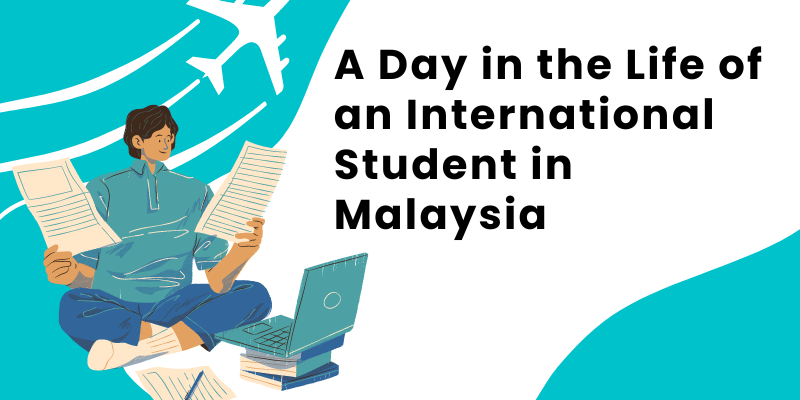A Day in the Life of an International Student in Malaysia
April 17, 2024
Anis

Are you thinking about studying abroad and considering Malaysia as one of your options? Like many others, you're probably wondering what to expect.
What's Malaysia like? What are people like? And what's the typical breakfast there—will it be to your taste?
We understand these questions, no matter how small they may seem. After all, studying abroad can be daunting, and you're worried that it might not live up to your expectations.
But don't fret! We're here to help you prepare as best as we can. Let's address any concerns you may have about being an international student in Malaysia.
What is a typical weekday like for an international student in Malaysia?
If you're an international student preparing to study in Malaysia, you might be thinking about how to manage your weekdays with classes.
Questions like "What is the earliest time classes start?" and "How many credit hours can I take each semester?" could be on your mind.
The answers to these questions depend on your course structure.
Regarding time classes, they usually run from 8 am to 6 pm, with breaks throughout the day.
A typical midday break usually falls between 12:50 pm and 2:00 pm. During breaks, you can go to campus facilities such as cafeterias, clinics, and study areas.
Your choice of accommodation is an important consideration. If you choose on-campus housing, you'll have less to worry about, as hostels are usually within walking distance of the campus.
But if you opt for off-campus living, factors like transportation, distance, and estimated travel time become significant.
Fortunately, most universities in Malaysia are conveniently located near public transportation options such as buses or trains, including university shuttle services.
Next is about the credit hour that you can take in a semester.
Typically, most courses require students to take a minimum of 15 credit hours per semester, with a maximum of 21 credit hours.
However, certain programs, especially those with specific faculty or university core subject requirements, may require more credit hours.
You will need to register the classes via the university system, which you can schedule your classes according to your most convenient time.
You can choose the subjects according to the time table given. So you must plan your classes wisely so that you will have sufficient time to take a short break between classes and to complete your studies based on the university study period.
When you register for classes via the university system, you can schedule them at your most convenient times. However, it's important to plan your classes wisely to ensure you have enough time for breaks between classes and to meet the university's study period requirements.
Another important thing to note is Malaysia's academic calendar is similar to that of Western countries, with two semesters running from around September to January and February to June, respectively.
This schedule allows for breaks between semesters, which students often use to hang out with friends, explore Malaysia, or travel to neighboring countries.
How do international students typically spend their weekends in Malaysia?

On weekends, you, as an international student studying in Malaysia, have a chance to take a break from your academic responsibilities and explore the country's natural beauty and rich cultural heritage.
You can engage in various activities, such as short trips, experiencing Malaysia's diverse landscapes, and participating in cultural events.
Popular destinations for weekend getaways include the Cameron Highlands and Genting Highlands, which offer refreshing mountain air, scenic views, and a variety of outdoor activities like hiking, guided tours of tea plantations, and fruit picking.
Additionally, you can enjoy outdoor adventures such as hiking, beach visits, or cave exploration in nearby regions. Nature lovers like you can explore Malaysia's diverse rainforests, including Taman Negara and Borneo's forests, where you can trek through dense vegetation, encounter unique wildlife, and appreciate the beauty of nature.
Cultural exploration is also an option during weekends. You can visit local markets like Pasar Seni or explore public attractions such as the National Art Gallery (Balai Seni Negara) and the Telekom Museum, easily accessible via public transportation.
If you're interested in Malaysia's theater scene, you can attend performances at Istana Budaya, although it's recommended to check for affordable ticket options online beforehand due to potential high prices.
These diverse activities, conveniently located near major urban areas, provide you with a chance to relax and recharge before returning to your academic commitments on Monday, thus helping to alleviate the stress of academic responsibilities.
Also read: Semester Break Exploration Guide For International Students in Malaysia
What kinds of extracurricular activities are available to students in Malaysian universities?
Other than doing activities on the weekends, you, as an international student, can also partake in extracurricular activities at the university.
Universities in Malaysia offer a wide range of extracurricular activities to cater to diverse interests, providing you with opportunities to engage in both academic and non-academic pursuits.
These activities play a crucial role in enhancing your overall student experience and fostering personal development.
Student clubs and societies are a prominent feature of university life in Malaysia. These clubs cover a wide range of interests, including arts and cultural, sports, academic, and hobby-based clubs.
You can join clubs related to your interests or cultural backgrounds, allowing you to connect with like-minded individuals and participate in various activities and events.
Sports and fitness are also popular among international students in Malaysia. Many universities have sports facilities, including gyms, swimming pools, and sports fields, where you can engage in a variety of sports and recreational activities.
Intramural sports leagues and tournaments are also organized, providing you with an opportunity to compete and display your athletic abilities.
Community service and volunteering are integral parts of university life in Malaysia. Many universities have partnerships with local communities and organizations, allowing students to participate in meaningful community service projects.
These projects not only benefit the community but also provide you with valuable leadership and teamwork skills.
How do international students in Malaysia balance academic and social activities?
Balancing academic commitments with social activities is a key aspect of your international student experience in Malaysia.
While academic success is a priority, fostering a healthy social life is equally important for your personal growth and well-being in a foreign country.
You often face the challenge of managing your time effectively to excel academically while also engaging in social interactions and extracurricular activities.
Here are some ways for you, as an international student, to balance academic and social activities:
1. Time management skills
Time management skills play a crucial role in achieving this balance. You, as an international student, learn to prioritize tasks, set realistic goals, and allocate time for studying, attending classes, and participating in social activities.
2. Participate in extracurricular activities
Participating in extracurricular activities can also help you strike a balance between academic and social life.
These activities provide a platform for you to meet new people, explore your interests, and take a break from your academic routine.
By engaging in extracurricular activities, you can develop a well-rounded personality and enhance your overall university experience.
3. Join study groups

Joining study groups can be beneficial for you as it helps you stay focused and motivated in your academic endeavors.
Collaborating with classmates allows for the exchange of ideas and knowledge, fostering a deeper understanding of course material.
Additionally, study groups provide opportunities for socialization and cultural exchange, enabling you to build relationships with peers who share similar academic interests.
However, it's important for you to conduct your own research before joining study groups. This allows you to organize important information and focus discussions on topics that require additional attention, thus maximizing the effectiveness of study sessions.
Furthermore, maintaining a clear objective during discussions helps you stay on track and avoid distractions, ensuring productive study sessions.
4. Maintain a healthy lifestyle
Maintaining a healthy lifestyle is crucial for you to effectively manage the challenges of studying in a new country.
Eating well, exercising regularly, prioritizing mental health, and getting enough sleep are essential for your overall well-being and stress management.
By prioritizing your health, you can maintain high energy levels and optimize your academic performance.
5. Be flexible to adapt to a new culture
Flexibility allows you to adapt to new situations and make the most of your study abroad experience.
Being open to change and willing to adjust your schedules based on academic and social demands can help you effectively balance your commitments.
What are the common challenges faced by international students in their daily life in Malaysia?
Studying abroad in Malaysia presents you, as an international student, with a range of challenges, from cultural adjustments to academic rigors. These challenges, while daunting, offer valuable opportunities for personal growth and cultural exchange.
1. Language barriers
One of the primary challenges you face is language barriers. While many universities in Malaysia offer courses in English, you may encounter difficulties in daily interactions, especially outside the campus.
However, most Malaysians are proficient in English, so you can easily overcome this challenge with regular practice and immersion in the local culture.
Also read: Language and Communication Tips for International Students Studying in Malaysia
2. Cultural differences
Cultural differences can also pose challenges for you. Malaysia's multicultural society, influenced by Malay, Chinese, Indian, and indigenous cultures, may be vastly different from your home country.
Adapting to new social norms, food, and customs requires an open mind and a willingness to learn.
3. Homesickness
Homesickness is another common challenge among international students.
Being away from family and familiar surroundings can be emotionally challenging, especially during festive seasons and important celebrations.
Universities in Malaysia often organize cultural events and support services to help students cope with homesickness and stay connected with their families.
4. New educational system
Adapting to a new educational system can pose challenges for you, especially regarding academic standards and teaching methodologies.
In Malaysia, universities prioritize interactive and student-centered learning approaches.
Classes often incorporate lectures, tutorials, seminars, and practical sessions.
This enables you to actively engage with course content and cultivate critical thinking and problem-solving abilities.
These methods may differ from those in other countries, where such practices might not be as prevalent.
Moreover, assessment in Malaysian universities is usually based on a combination of coursework, such as assignments and presentations, while examinations are typically held at the end of each semester.
Also read: Understanding University Grading System in Malaysia
5. Financial constraints
Financial challenges present a significant hurdle for many international students in Malaysia.
The management of living expenses, tuition fees, and travel costs can induce stress, particularly for students hailing from less privileged backgrounds.
Nonetheless, scholarships, part-time employment opportunities, and adept budgeting skills offer avenues to navigate these financial constraints more effectively.
Additionally, you are permitted to engage in part-time work for up to 20 hours per week during semester breaks and holidays.
Employment opportunities may include positions in restaurants or mini markets, provided your Student Pass remains valid.
While part-time employment can furnish you with valuable work experience and supplementary income, it is important for you to strike a balance between your work commitments and academic obligations.
Also read: International Student Guide: Applying for a Malaysian Student Visa
How do international students in Malaysia interact with the local culture and community?
Interacting with the local culture and community is a rich and rewarding aspect of studying in Malaysia for you as an international student.
Malaysia's cultural diversity, with its Malay, Chinese, Indian, and indigenous influences, provides a unique opportunity for you to immerse yourself in a vibrant and inclusive society.
Here are some ways you can interact with local culture and community:
1. Local food
One of the most common ways you interact with the local culture is through food. Malaysian cuisine is renowned for its bold flavors and unique combinations, reflecting the country's multicultural heritage.
Food is a universal language that brings people together, and sharing a meal with locals provides you with a unique opportunity to connect on a personal level, bonding over a shared love for food.
This shared dining experience fosters friendships and allows you to learn more about Malaysian culture, traditions, and way of life.
Trying local food also provides you with an opportunity to learn about Malaysian ingredients, cooking techniques, and culinary traditions.
2. Participate in cultural events and festivals
Participating in cultural events and festivals is another way you can engage with the local community. Malaysia celebrates a variety of cultural and religious festivals, including Hari Raya, Chinese New Year, Deepavali, and Christmas.
These festivals are marked by colorful celebrations, traditional performances, and communal gatherings, providing you with a firsthand experience of Malaysia's cultural richness.
Many universities in Malaysia also organize cultural exchange programs and community engagement initiatives, allowing you to interact with local communities, learn about Malaysian traditions, and contribute to community development projects.
Through these activities, you gain a deeper appreciation for Malaysian culture and forge meaningful connections with local residents.
Also read: The Cultural Experience of Being A Student in Malaysia
3. Volunteer work and community service

Many students in Malaysia actively engage in volunteer work and community service as a way to give back to the local community.
This can include participating in community clean-up projects, organizing charity events, or volunteering at local schools, orphanages, or elderly care centers.
By volunteering, you not only contribute to the betterment of society but also gain a deeper understanding and appreciation of Malaysian culture and values.
Volunteering provides you with the opportunity to interact with locals from different walks of life, fostering cross-cultural understanding and empathy.
4. Build friendships with locals
Malaysians are open and friendly people, always ready to become good friends with students who come from far away.
Building friendships with locals is easy as they will invite you to cultural celebrations and events, show you wonderful places, and support your interests in their culture.
Studying abroad in Malaysia offers you a transformative experience filled with academic growth, cultural immersion, and personal development.
A typical day for you as an international student in Malaysia is a blend of academic pursuits and social activities, set against the backdrop of Malaysia's vibrant culture and natural beauty.
Traveling to Malaysia as an international student is a rewarding journey that broadens your horizons, challenges your perspectives, and enriches your life.
By embracing the opportunities and overcoming the challenges, you create memories and experiences that last a lifetime in Malaysia.
Kickstart your education in Malaysia
We'll help you find and apply for your dream university
You might be interested in...
- From a Childhood Dream to a Lifelong Vocation: Study Doctor of Medicine at UCSI
- Why Master's Degree Students are Encouraged to Continue Their PhD?
- Top Countries With the Most International Students
- Updated: Malaysian universities continue to make progress in THE World University Rankings 2023
- Careers That Would Be Sought After In The Future In Malaysia: Job Demand Guide
- The Importance of Digital Skill and Technology Courses in Malaysia
- Student Tips: How To Spend Your Days In Penang
- 5 Reasons To Consider Malaysia For Your MBA
- From UK to Malaysia: “I love the weather!”
- This unexpected country dominates in 2018 rankings for best Student-to-Staff ratio





 +60173309581
+60173309581